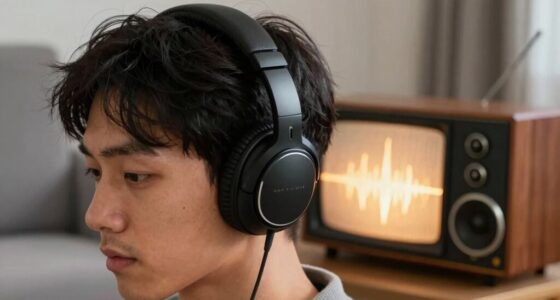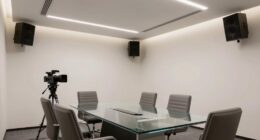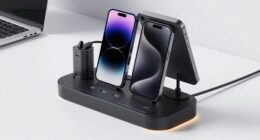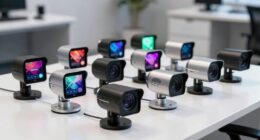Picture yourself on a cruise where all announcements, shows, and safety drills are effortlessly accessible to deaf passengers. Envision a situation where a deaf traveler can communicate their dietary preferences, fully comprehend onboard activities, and feel included in every part of the voyage.
How does one ensure such a tailored experience? The answer lies within the pages of 'Cruise With Heart: a Deaf-Friendly Guide to Seamless Travel.'
Key Takeaways
- Choose Deaf-friendly cruises for seamless communication and tailored experiences.
- Ensure accommodations include visual and tactile signaling systems for safety and accessibility.
- Request ASL interpreters and advance communication services for a smooth cruise experience.
- Engage in inclusive activities with ASL interpreters and accessibility features provided.
Benefits of Choosing Deaf-Friendly Cruises
Choosing deaf-friendly cruises ensures seamless communication and accessibility for deaf travelers throughout their journey. These cruises go above and beyond by providing essential services like sign language interpreters, assistive listening devices, and closed captioning for shows and movies.
The availability of sign language interpreters onboard allows for effortless communication, ensuring that individuals with hearing loss can fully engage and participate in all activities and conversations. Additionally, the provision of assistive listening devices enhances the overall experience by making it easier for deaf travelers to enjoy entertainment options.
Moreover, special accommodations such as visual and tactile signaling systems in public areas contribute to a more inclusive environment where everyone feels welcome and understood. By offering amplified telephones and closed-caption TV services, deaf-friendly cruises cater to the specific communication needs of guests, making the journey not just accessible but enjoyable.
Travelers can rest assured that their requests and preferences regarding communication support will be well-received and promptly addressed by the attentive ship staff and accessibility coordinators.
Preparing Your Deaf-Friendly Packing List

When preparing your deaf-friendly packing list for your upcoming cruise, consider the specific essentials tailored to different cruise destinations to ensure a comfortable and enjoyable travel experience. Depending on the destination, packing items that cater to the climate and activities available can enhance your overall cruise vacation.
Here are some key items to include in your packing list for a wide range of cruise destinations:
- Layered Clothing: Pack layers and waterproof jackets for destinations like Alaska to stay warm and dry during varying weather conditions.
- Accessories: Include good shoes, a hat, gloves, binoculars, and a camera for cruises to Alaska and Australia/New Zealand.
- Swimwear and Sun Protection: Essential items for Mediterranean cruises include swimwear, beach outfits, comfortable shoes, and a sun hat for sunny days.
- Formal Attire: Follow dress codes for casual, smart casual, and Evening Chic attire onboard during your Mediterranean cruise.
- Comfortable Day Wear: Consider bringing season-appropriate clothing, swimwear, comfortable day wear, walking shoes, and binoculars for a Transatlantic cruise.
Packing these essentials will help you be prepared for both onboard activities and any land tours during your cruise vacation.
Accessible Accommodations and Amenities
When planning a cruise as a deaf traveler, it's essential to consider the accessible accommodations and amenities available to ensure a comfortable experience. Room accessibility features, such as visual and tactile signaling systems, can enhance navigation and communication on board.
Additionally, the availability of sign language interpreters and visual alert systems can further facilitate seamless interactions during the journey.
Room Accessibility Features
In deaf-friendly accommodations onboard, various visual and tactile signaling systems are thoughtfully integrated to enhance navigation ease for travelers with hearing impairments. Rooms designed for accessibility often include features tailored to the needs of deaf individuals. These may encompass:
- Visual signaling systems: Utilized in public areas for improved navigation.
- Vibrating alarm clocks: Ensuring travelers are promptly alerted without relying on sound.
- Closed-caption televisions: Allowing guests to enjoy entertainment with subtitles.
- Bed shakers: Providing a tactile alarm option for waking up.
- Visual fire alarms: Enhancing safety measures by alerting guests visually in case of emergencies.
These amenities contribute to a more inclusive and secure environment for deaf travelers seeking a seamless cruising experience.
Sign Language Interpreters
Our commitment to ensuring seamless communication and accessibility for deaf travelers is exemplified through the provision of ASL interpreters on Heart Cruises' deaf-friendly vacations. These skilled interpreters are available to assist deaf guests during onboard activities and excursions, facilitating interactions with crew members, fellow travelers, and local guides.
Deaf travelers can request sign language interpreters in advance to guarantee smooth communication throughout their trip, ensuring a truly inclusive travel experience. Heart Cruises' dedication to accessibility extends to providing these interpreters, underscoring the company's commitment to meeting the diverse needs of all guests.
Visual Alert Systems
Enhancing the accessibility of accommodations and amenities for deaf and hard of hearing individuals, visual alert systems provide vital notifications through flashing lights or vibrating devices. Deaf-friendly cruise ships ensure safety and convenience by offering visual signaling devices for doorbells, telephones, and smoke alarms. Vibrating alarm clocks and bed shakers are commonly provided to wake guests up without relying on auditory cues. These accommodations are especially beneficial for travelers exploring destinations like the Greek Isles, where visual cues play a crucial role in ensuring a seamless experience. By incorporating these innovative solutions, cruise lines are transforming the travel landscape for individuals with hearing impairments.
- Visual alert systems in cabins, public areas, and bathrooms
- Doorbell, telephone, and smoke alarm signaling devices
- Vibrating alarm clocks and bed shakers
- Importance of visual cues in travel experiences
- Enhancements for deaf and hard of hearing individuals
Sign Language Interpreters Onboard

We understand the importance of having Sign Language Interpreters onboard for deaf travelers.
The availability options and communication accessibility features provided by these interpreters significantly enhance the experience for deaf passengers.
It ensures effective communication throughout the journey, facilitating interactions with the staff and crew.
Interpreter Availability Options
For seamless communication throughout your cruise experience, Heart Cruises offers ASL interpreters onboard for deaf travelers. When considering interpreter availability options, here's what you need to know:
- ASL Interpreters Provided: Heart Cruises ensures ASL interpreters are available for the entire cruise duration.
- Advance Requests: Deaf passengers can request interpreters in advance for specific activities or events.
- Trained Interpreters: All interpreters onboard are trained professionals to guarantee effective communication.
- Enhanced Experience: ASL interpreters are available upon request to enhance the travel experience for deaf individuals.
- Accessibility Assurance: Heart Cruises prioritizes accessibility and inclusivity by offering ASL interpreters for all passengers.
Communication Accessibility Features
Heart Cruises ensures seamless communication accessibility for all passengers by providing American Sign Language (ASL) interpreters onboard. These interpreters can be requested in advance, allowing deaf travelers to fully engage in shows, activities, announcements, and interactions throughout the cruise.
By offering ASL interpreters, Heart Cruises enhances the overall experience by bridging communication gaps between deaf passengers and the crew. This commitment to inclusivity ensures that all passengers can participate and enjoy the cruise to the fullest. The presence of ASL interpreters reflects our dedication to innovation and creating a welcoming environment for individuals with diverse communication needs.
At Heart Cruises, we prioritize making every aspect of the journey accessible and enjoyable for all.
Communication Tips for Smooth Sailing
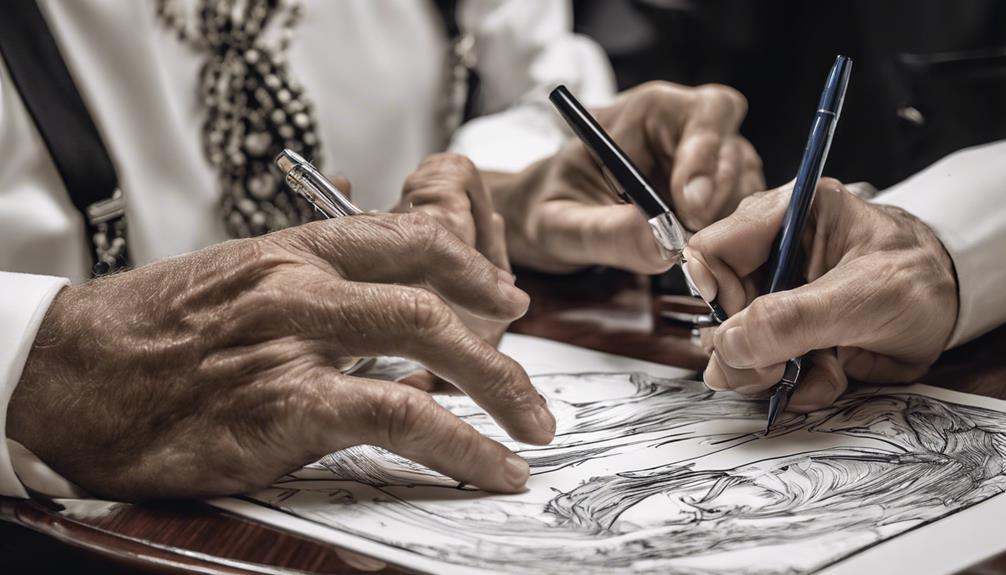
To ensure clear and effective communication during your cruise, consider utilizing the assistive listening devices provided by cruise lines. These devices are designed to enhance your communication experience onboard. Here are some communication tips for smooth sailing:
- Request Assistive Devices Early: Contact the accessibility coordinator before boarding to request the assistive listening devices you may need.
- Confirm Your Needs: Ensure that your communication needs are confirmed and understood by the cruise staff to guarantee appropriate accommodations.
- Arrange for Sign Language Interpreters: With advance notice, sign language interpreters can be arranged for shows, activities, and emergencies.
- Utilize Closed Captioning Services: Enjoy shows and movies with closed captioning services, providing accessibility for Deaf or hard of hearing guests.
- Explore Amplified Telephones and Closed-Caption TV: Take advantage of amplified telephones and closed-caption TV services onboard for additional communication support.
Deaf-Friendly Excursions and Activities

When planning deaf-friendly excursions and activities, we prioritize creating immersive experiences tailored to the specific needs of the Deaf community. Our activities are thoughtfully designed to ensure accessibility and inclusivity for all participants.
From sightseeing tours to cultural workshops and nature adventures, each experience is crafted with the unique needs of Deaf travelers in mind. ASL interpreters are often available to enhance communication, fostering a deeper understanding of the surroundings.
We focus on providing visual and tactile experiences that engage all senses, making the activities not only accessible but also enriching and captivating. By prioritizing these considerations, our goal is to create a welcoming environment where Deaf travelers can fully enjoy and connect with their travel experiences.
Our commitment to innovation and inclusivity drives us to continually improve and expand our range of deaf-friendly excursions, ensuring that all participants have the opportunity to explore and engage in meaningful ways.
Dining and Food Allergies Considerations

In ensuring a seamless and inclusive experience for travelers, our attention now shifts to the vital aspect of Dining and Food Allergies Considerations within the realm of travel planning. Cruise lines prioritize the dining experience for all guests, including those with food allergies, by offering specialized menus and accommodations. Guests are encouraged to inform the dining staff in advance about their specific food allergies and dietary restrictions to ensure a safe dining experience.
Here are some key considerations for guests with food allergies:
- Cruise lines offer special menus and accommodations for guests with food allergies.
- Guests can inform the dining staff in advance about their food allergies and dietary restrictions.
- Special dietary needs are catered to with options like gluten-free, vegetarian, and lactose-free meals.
- Cruise ships have trained chefs and staff to handle food allergies safely and efficiently.
- Allergen information for dishes is available upon request to ensure a safe dining experience for guests with food allergies.
Safety Measures and Emergency Protocols
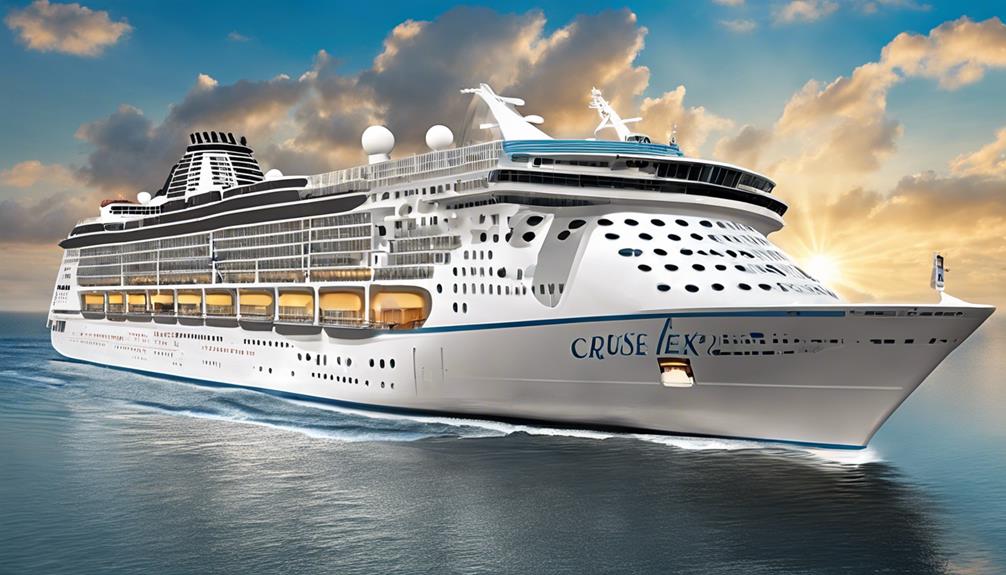
Our commitment to ensuring a safe and inclusive environment onboard extends to robust safety measures and emergency protocols tailored to meet the needs of all passengers, including those with specific communication requirements. Cruise ships are equipped with visual smoke detectors and bed shakers for guests with hearing impairments, ensuring they can promptly respond to emergencies. Passengers are encouraged to pack extra batteries for their hearing devices to stay prepared in case of unexpected situations. Communication plans for device failures are essential and should be easily accessible. In the event of an emergency, staff onboard are trained to assist guests with special communication needs effectively. Moreover, safety devices are strategically placed throughout the ship to ensure all passengers, regardless of their communication abilities, can receive emergency alerts promptly.
| Safety Measures | Details |
|---|---|
| Visual Smoke Detectors | Installed for guests with hearing impairments to alert them during emergencies. |
| Bed Shakers | Provided to wake guests with hearing impairments in case of emergency situations. |
| Communication Protocols | Plans for device failures should be documented and easily accessible to all passengers. |
Booking Tips for Deaf Travelers

How can we best ensure a seamless booking experience for deaf travelers seeking inclusive accommodations on their cruise journey? When booking a cruise, deaf travelers can take specific steps to ensure their needs are met throughout the journey. Here are some essential tips:
- Choose Deaf-Friendly Cruise Lines: Opt for cruise lines that offer assistive listening devices and sign language interpreters for a more inclusive experience.
- Communicate Your Needs Early: Inform the ship staff and accessibility coordinators about your specific requirements before boarding to receive appropriate accommodations.
- Utilize Special Services: Take advantage of services like closed captioning for shows and movies, amplified telephones, and closed-caption TV services tailored for deaf travelers.
- Request Additional Accommodations: Enhance your experience by requesting visual and tactile signaling systems in public areas to facilitate communication.
- Advocate for Your Needs: Ensure that your communication needs are met during the cruise by advocating for enhancements and speaking up about any challenges faced.
Frequently Asked Questions
Are There Any Specific Cruise Lines That Are Known for Providing Excellent Deaf-Friendly Services?
Absolutely, some cruise lines stand out for their exceptional deaf-friendly services. Royal Caribbean, for example, is known for its innovative approach to accessibility, offering features like closed-captioned shows and TTY devices.
Carnival Cruise Line also excels in this aspect, providing ASL interpreters and visual-tactile alert systems. These cruise lines prioritize inclusivity, ensuring all guests, including those who are deaf or hard of hearing, have a seamless and enjoyable travel experience.
How Can Deaf Travelers Communicate With Crew Members Who May Not Know Sign Language?
When sailing and facing language barriers with crew members, we suggest using technology like note-taking apps or pre-written cards to bridge communication gaps. These tools can help convey basic needs or questions effectively.
Additionally, seeking out crew members who may know basic sign language or finding an interpreter onboard could also enhance communication. By being proactive and resourceful, deaf travelers can navigate interactions with crew members smoothly and ensure a positive experience.
What Resources Are Available for Deaf Travelers Who May Need Assistance in Emergency Situations?
In emergency situations, deaf travelers can access resources like visual alert systems, vibrating devices, and written communication aids. These tools help us quickly convey our needs to crew members and receive assistance promptly.
It's crucial for cruise lines to have clear emergency procedures in place, with visual cues and staff trained in accommodating diverse communication needs. By ensuring these resources are available, deaf travelers can navigate emergency situations with confidence and support.
Are There Any Specific Guidelines for Deaf Travelers When Participating in Onboard Activities?
When participating in onboard activities, deaf travelers may benefit from seeking out visual or written materials to supplement auditory information.
It's essential to communicate any specific accommodations needed to staff beforehand. Utilizing technology like speech-to-text apps or vibrating alert devices can enhance the experience.
Additionally, staying aware of emergency protocols and accessing interpreters if necessary can ensure a smooth and enjoyable cruise experience for all travelers.
How Can Deaf Travelers Ensure They Receive Proper Accommodations for Medical Needs During the Cruise?
Ensuring proper accommodations for medical needs during a cruise is vital for deaf travelers. We must communicate our requirements clearly to the cruise line before embarking.
What Makes a Cruise Deaf-Friendly and Seamless for Travel?
When it comes to deaffriendly cruises 2024, clear communication is key. Providing sign language interpreters, closed captioning, and visual alerts can make the cruise experience seamless for deaf travelers. Additionally, offering accessible staterooms, vibrating alarm clocks, and visual-tactile emergency alarms can make the journey more enjoyable for deaf passengers.
Conclusion
In conclusion, cruising with heart means embarking on a journey filled with deaf-friendly accommodations and amenities. From sign language interpreters onboard to accessible excursions and activities, every aspect of the travel experience is tailored to meet the unique needs of deaf passengers.
By following communication tips and preparing a deaf-friendly packing list, deaf travelers can sail smoothly and safely, ensuring a seamless and satisfying cruise experience.
Choose deaf-friendly cruises for a truly inclusive and unforgettable adventure!






